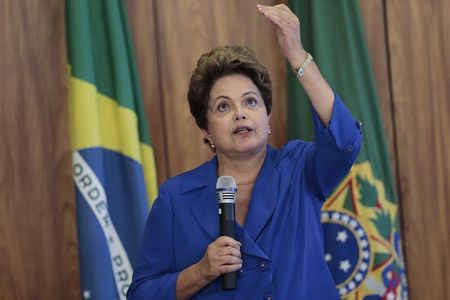By Brian Winter
SAO PAULO (Reuters) - Brazil's President Dilma Rousseff is politically responsible for a growing money-laundering and bribery scandal at state-run oil company Petroleo Brasileiro SA, although she was probably not personally involved enough to justify impeachment, the main opposition party's leader in the Senate said.
Aloysio Nunes of the centrist Brazilian Social Democracy Party (PSDB) said in a speech on the Senate floor late Monday that it was unclear whether Rousseff, who was reelected to a second term on Oct. 26, knew about the alleged corruption.
Prosecutors say that Petrobras, as the company is known, systematically overpaid for assets and work by contractors and that the excess funds were then illegally funneled to political parties, including Rousseff's own.
Petrobras has delayed the release of its third-quarter earnings to investigate the allegations, which have caused its shares to fall. Rousseff was the chairwoman of the company's board from 2003 to 2010, when much of the graft allegedly took place, but has denied knowledge of any crimes.
"Could it really be that she didn't know, that she wasn't able to activate control mechanisms at Petrobras?" Nunes asked in his speech. "She had every ... opportunity to know what was happening ... but she didn't. So she's responsible," he said.
Nunes said that, while Rousseff had benefited politically from the corruption scheme, he would not describe her as "personally dishonest," and he did not accuse her of being the mastermind of the scheme.
That distinction is consistent with previous private and public comments by senior PSDB leaders, who tend to see Rousseff as a relatively clean figure in the ruling Workers' Party, which they consider otherwise plagued by graft.
Nunes said, therefore, that at this time the party should not consider impeaching her - which he called a "rigorous process, traumatic, which depends on absolutely unequivocal proof from a legal point of view."
Jose Agripino, head of another large opposition party, made similar comments in an interview published on Tuesday, telling Valor Economico: "It's hard (to believe) she had no information ... (but) I can't say she knew everything."

Rousseff has said that prosecutors should fully investigate whether any crimes occurred, and expressed hope the scandal will lead to less corruption in Brazil.
(Reporting by Brian Winter; Editing by Chizu Nomiyama)
